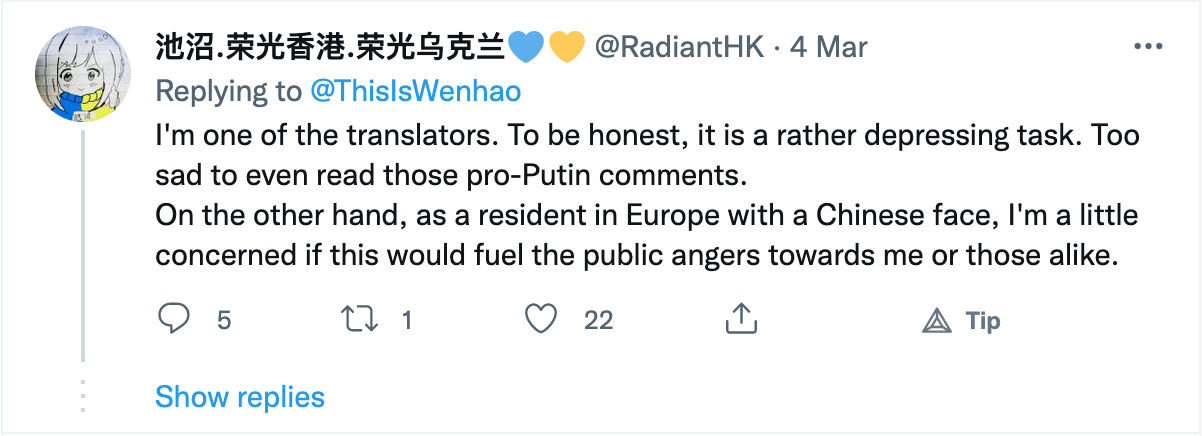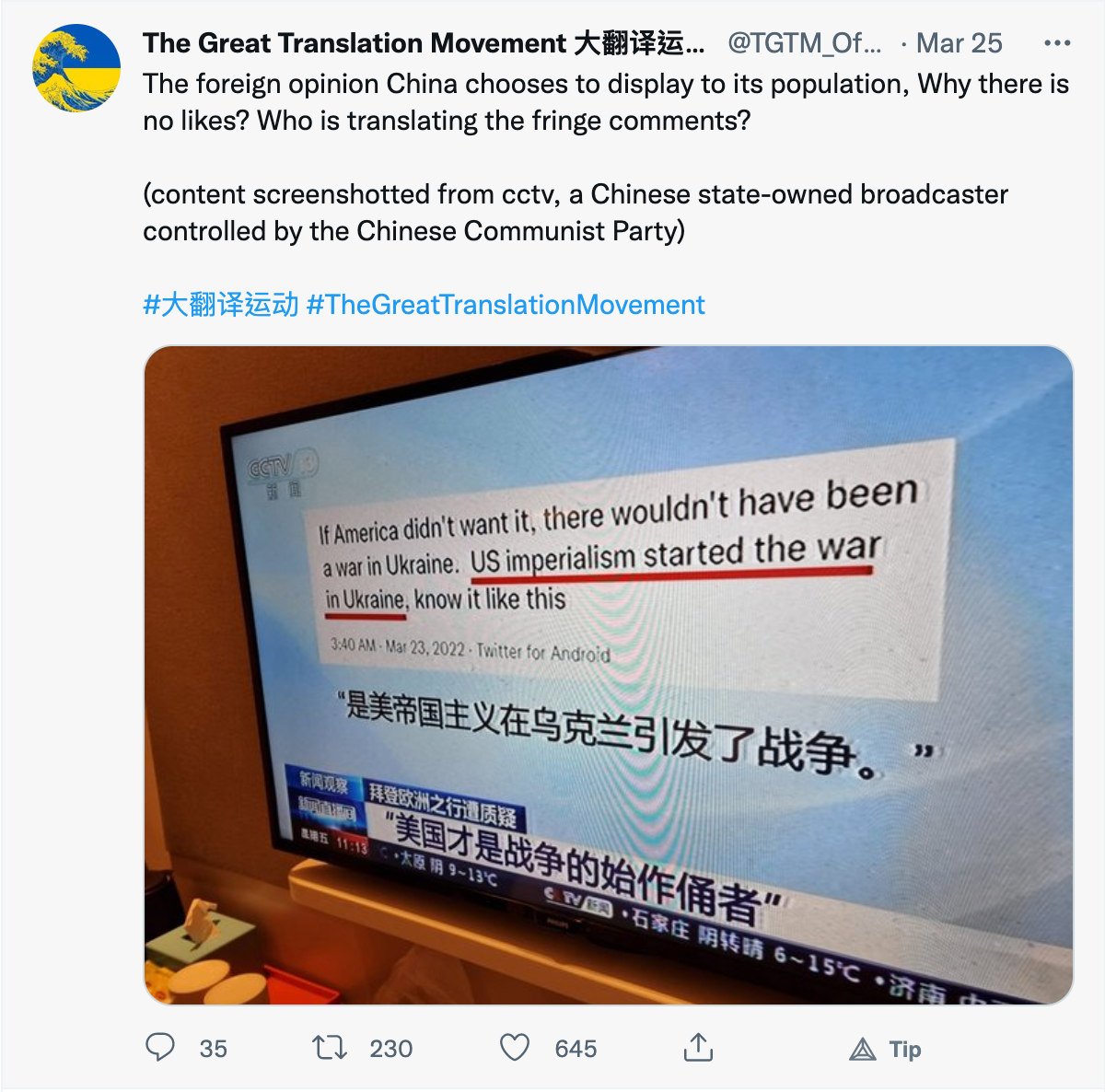
翻譯圍爐💬👻📑📚📝🗺
Translation Steps Are Trending|One Translation Arouses Thousands of Waves - Talking About "The Great Translation Movement"
“Fourth estate, wanderer, Chinese information, holds muck-rake in hand, wears crown from gutter. Not responsible for original content, peace and love. Squeak~”
("The Fourth Power, Ronin, transmits information about China, holds a dung rake, and uses the ditch as a crown [1], not responsible for the original content, love and peace. Tweet Mi~")
The account profile of "The Great Translation Movement's official Twitter account" says so. This fresh and hot Twitter account, created in March 2022, has aroused discussions from all sides since its creation. Many social activists translate reports on social movements in their own countries on Twitter, but the "Official Twitter account of the Great Translation Movement" itself is a social movement, specializing in translating "anti-revolutionaries" circulating on Chinese social media such as Weibo and Zhihu. Human beings, advocating war, and disregarding life and basic human rights", let more people know that the Chinese are not as warm and warm as the propaganda created. The latest translations include the topic "Study confirms that the new coronavirus was made by an American company" on Weibo, a student's comment on Weibo discussing the need to report anti-Russian teachers, and CCTV's commentary on "U.S. imperialism is waging war in Ukraine" and many more. Compared with other Twitters (such as SupChina, What's on Weibo) that have been translating Chinese netizens' remarks, the "Great Translation Movement" has received much more attention. So far, 27,500 people have followed, and more than 1,000 posts have received the most enthusiastic response. People like it.
However, attention is also accompanied by controversy. In addition to the care of the official media Global Times, the comments under the post also have disputes over the selection of translation materials. Some Chinese netizens said that "many people's voices cannot be heard under the censorship system." Therefore, the translation of the Great Translation Movement is one-sided, which can easily have a one-sided impact on readers. A "ronin" in Europe admitted that although he was involved in the translation, he was still "a little concerned if this would fuel the public anger towards me or others in similar situations". me or those alike)”.


Indeed, although media such as "What's on Weibo" have translated all kinds of strange remarks on Weibo, there are also Weibo articles such as "A Shanghai resident's record of the new crown" reflecting the internal chaos in China. In contrast, although the "Great Translation Movement" emphasizes that translation only reflects the real situation, its attitude is much more obvious. It is clear that through translation, the ugly side of Chinese netizens is directly exposed.
In this regard, the "Great Translation Movement" established the principle of selecting translation materials at a very early stage. For example, "influential speeches should be selected, such as tens of thousands of retweets and likes on Weibo, and tens of thousands of likes on Zhihu." Ben is more representative, and believes that failure to follow this principle "is likely to be counterproductive." However, it seems that even if these principles are fulfilled, there are still many people who think that the selection of materials is one-sided. And this is undoubtedly contrary to the principle and purpose of translation in the eyes of many people. When we talked about translation during the Hong Kong social movement before, we mentioned that translation has long given the impression of being neutral and detached, aiming to convey messages sincerely and sincerely, rather than expressing a position. , more and more translators and even non-translators are engaged in translation in different large-scale social movements around the world, expressing their own political opinions and demands through translation. By selecting and translating "missing narratives", Attract public attention, call on people of all countries to support, and even stop the oppression of certain ethnic groups by the power. Therefore, the selection and translation of texts are often based on ideas, and the requirements for the complete presentation of information are relatively low. Take CCTV’s report on Twitter that someone commented “U.S. imperialism launched a war in Ukraine” as an example. Although the content is indeed in line with the domestic position of the Chinese state media, especially for foreigners who are not familiar with it, it is inevitable to be suspected of taking it out of context (of course, adding translation to the video will make the technical cost of participating in the movement much higher. That's another topic again).

Although this kind of fragmented information processing is euphemistically called "translating real words and sentences, the public has their own opinions", and it is concise and easy to understand, but like all information fragments on the Internet, due to the lack of context and background information, it is easy for people to ignore things The complex context behind it, such as the manipulation and screening of information by the central government. Of course, this also involves the threshold of participation. Because the main axis of the movement is decentralized mass translation, if the general masses are to be as objective and comprehensive as the media can explain social events, the entire "Great Translation Movement" cannot achieve the original intention of widespread participation. And paradoxically, even a detailed explanation of the overall appearance of public opinion in each post (aka adding an annotation) does not mean that the translation of the text is more objective, since the choice of text and translation techniques have already revealed the translator's Position, presentation and interpretation of social events are no exception.
In the spectrum of Activist translation, the "Great Translation Movement" is just one of the more prominent and radical examples. Of course, the direct exposure of extremist remarks inside the wall is powerful in one fell swoop, and even has the opportunity to take it out of context, to harm other Chinese who do not agree with the mainstream public opinion in China, and to deepen the contradictions among those with different opinions, but to a certain extent, it does make the Chinese government have to correct it. In view of the increasingly excessive remarks in China, in addition to using the official media to respond, some comments on the Russian-Ukrainian war on social media should also be deleted, so as not to damage the image of "beautiful China". Whether it's good or bad, it's up to the judges to judge for themselves.
What do you think of this translation-based micro-social movement?
[1] The English "muckraker" is a metaphor for a reporter who exposes scandals; "gutter" also refers to a poor and lowly state.
【Portal】 💬
Duan Media | Chauncey (March 23, 2022), Can the "Great Translation Movement" Fight the Great Outreach: A Decentralized Internet Action by Dissidents
Radio Free Asia | Hsia Hsiao-hwa (15 March 2022), Anonymous account translates China's online discourse on Ukraine — Radio Free Asia
Global Times (24 March 2022), GT Investigates: Behind the online translation campaign are a few Chinese-speaking badfaith actors fed by antagonistic Western media — Global Times
The Great Translation Movement official Twitter account
What's on Weibo (@WhatsOnWeibo) / Twitter
=========
InBetween Translators' Collaborative 🏠👯♀️
Translation | Transcription | Proofreading | Reviewing | Copyediting | Copywriting | Typesetting
.
Enquiries ✉️: inbetween.trans@gmail.com
Follow us on Instagram ✨: @inbetween.trans
Like my work?
Don't forget to support or like, so I know you are with me..
Comment…